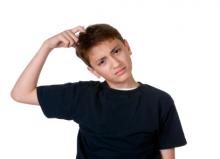
Experts recommend that student-athletes avoid strenuous physical activity and activities that require mental exertion during the first few days after concussion.
While strict bed rest is NOT recommended, strenuous physical activity may make concussion symptoms worse and has the potential to delay recovery.
As a result, experts recommend broad restrictions on physical activity in the first few days after a concussion, including:
- no sports
- no weight training
- no cardiovascular training
- no PE classes
- no exercise
- no chores that result in perspiration/exertion;
- no leisure activities, such as bike riding, street hockey, and skateboarding, that risk additional head injury or make symptoms worse.
Just as an athlete recovering from a concussion needs to get physical rest, he needs cognitive (mental) rest as well to allow the brain time to heal.
There are two main reasons for limiting scholastic and other mental activities. First, engaging in activities that require a great deal of thinking or paying concentrated attention may make an athlete's concussion symptoms worse. Second, student-athletes who do not limit mental activty after sport-related concussion have been shown to take longer to recover than those who limit such activity.
Mental rest means:
- taking time off from school or work;
- No or reduced homework;
- No or limited reading;
- No or limiting visually stimulating activities, such as computers, video games, texting or use of cell phones, and limited or no television;
- No trips, social visits in or out of the home; and
- Increased rest and sleep.
Near full mental rest in the first three to five days after injury is encouraged, followed by a gradual return to cognitive activity, so long as it does not trigger a return of symptoms.
For more about the importance of physical and cogntive rest, click here.



